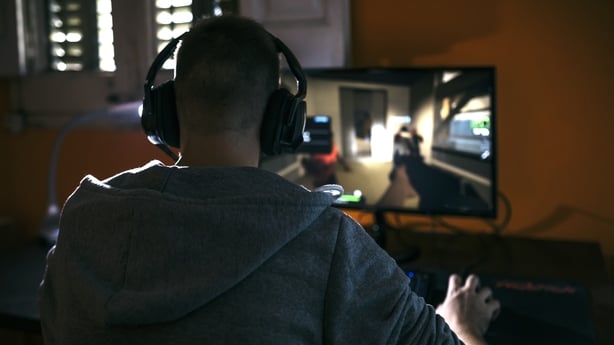A video posted to social media claimed to show Hamas fighters shooting down an Israeli war helicopter in Gaza.
The footage was actually taken from a video game.
Another video claimed to show Israeli jets bombing targets in northern Gaza.
But it was actually footage of fireworks celebrating a football win in Algeria three years ago.
In recent weeks, the Israel-Hamas conflict has seen a sharp rise in fake videos and photos being posted to social media in a bid to mislead internet users and sow confusion and doubt.

Dr Eileen Culloty is an Assistant Professor in the School of Communications at Dublin City University.
She said that unfortunately, in times of war, truth is often the first casualty.
"There is a sad and sorry history of people using dehumanising rhetoric to justify crimes in war, so none of that is new," Dr Culloty said.
"But what has happened with social media is the volume of it and the pressures that it puts on people to navigate it," she added.
The European Commission is ramping up the pressure on social media companies to do more to tackle disinformation in order to comply with the Digital Services Act (DSA).
We need your consent to load this rte-player contentWe use rte-player to manage extra content that can set cookies on your device and collect data about your activity. Please review their details and accept them to load the content.Manage Preferences
The new EU rules mean heavy fines for platforms if they fail to remove illegal content.
Because so many of the big tech firms have their European headquarters here, Ireland will play a leading role in policing the spread of disinformation.
It is a job that will fall to the newly established media regulator, Coimisiún na Meán, from February of next year.
The commission's Executive Chair is Jeremy Godfrey.
"If the tech firms comply with their obligations there won't be any need for us to be tough with them but our role will go beyond disinformation and we will be making sure that all their obligations under the Digital Services Act and under our Online Safety Code are complied with," Mr Godfrey said.
"We are recruiting the staff that we need. The Government has made sure we have enough money, they doubled our budget for the DSA in the budget for next year," he added.

Advances in artificial intelligence (AI) are making manipulated videos, known as 'deep fakes', harder to spot.
Posts showing political leaders or celebrities appearing to say words they never actually spoke can help amplify false messages online.
Irish tech company VidayoPro this week launched a new AI tool for generating educational videos.
VidayoPro CEO Brendan Kavanagh said artificial intelligence shouldn't be seen as the enemy when it comes to the spread of disinformation.
"The paradox is that probably AI also provides the answer in terms of how fast it can establish disinformation and malinformation," Mr Kavanagh said.
"I think there needs to be guidelines and rules in the area of disinformation but is this really about AI or is it about the social platforms that have hosting information that is not in any way verified for a very long time?" he asked.
Tomorrow is the deadline for members of the public to have their say on the development of a new National Counter Disinformation Strategy.
It is a Government initiative designed to have a more coordinated and strategic approach to combating the damaging impact of disinformation.
"Disinformation is a very complex problem, there are so many different components," said Dr Culloty.
"There is psychology, politics, technology and the dynamics of it are always changing, so a national strategy can set out some broad principles on how we go forward."
There is no denying that disinformation is a problem in Ireland from wild conspiracy theories about Covid-19 to far right groups using social media to stoke anti-immigrant protests.
In a recent report on disinformation filed with the European Commission, TikTok said it had uncovered and shut down a covert influence operation targeting users in Ireland with divisive views in a bid to intensify social conflict.
Whether it is footage of fighting in the Middle East or fake videos of celebrities, individuals can play their part in stopping the spread of disinformation by following reliable sources and by not sharing questionable content.






